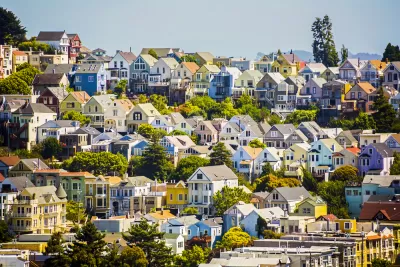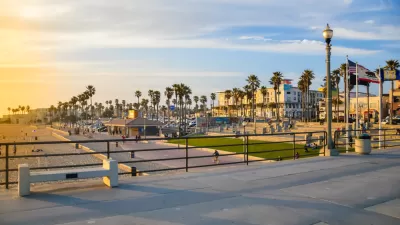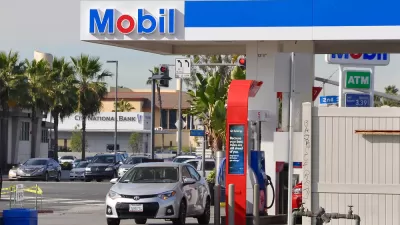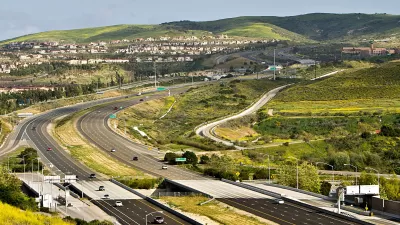Newly inaugurated California Gov. Gavin Newsom made waves on Thursday in his budget address, threatening cities and counties with the possibility of losing a portion of their gas tax subventions if they fail to meet their state housing requirements.

California's 40th governor, Gavin Newsom, has already made a strong case for aggressively tackling the state's chronic housing shortage by calling for a "Marshall Plan for affordable housing" in his inaugural address on Jan. 7. He took it up several notches during the presentation of his first state budget three days later by "making some startling statements connecting housing with transportation funding," reports Melanie Curry, editor of Streetsblog California.
During his long and detailed speech–he talked for almost an hour before taking questions from reporters–he said he would withhold gas tax funds from regions that did not meet state housing goals.
Newsom, a Democrat, was not referring to the entire state gas tax [41.7 cents excise tax + 13.83 cents "other state taxes/fees" = 55.53 cents per gallon, per API (pdf)], just the 12-cents per gallon excise tax that was added on Nov. 1, 2017, due to the passage of Senate Bill 1. Last November, voters upheld the new transportation taxes and fees in the Road Repair and Accountability Act of 2017 by rejecting Proposition 6.
"Once [SB 1 is] fully implemented, approximately $1.5 billion per year in new revenue is earmarked for local streets and roads maintenance and rehabilitation and other eligible uses, including complete streets projects, traffic signals, and drainage improvements," according to the California State Association of Counties.
In his budget speech on Thursday, Newsom said that the state, presumably the Department of Housing and Community Development (HCD), "will come up with a new way to estimate and allocate housing needs that is more 'realistic and nuanced' than the current system wherein each region defines its own regional housing needs and allocates them to cities, frequently based on not much more than local preference," adds Curry.
How many jurisdictions would be affected
In 2016, 97 percent of the state's cities and counties had not fully met their state-mandated requirement to provide both affordable and above moderate income, or market-rate housing, according to HCD.
Easier threatened than done
"It would take new legislation to be able to withhold gas tax money, and that would mean an ugly fight," explains Curry.
Senator Jim Beall (D-San Jose), head of the Senate Transportation Committee and author of S.B. 1, responded to Newsom’s announcement with a statement saying: “We have an obligation to the voters who overwhelmingly supported S.B. 1 that addresses the enormous local and state backlog of road safety and repairs needs. I certainly hope these funds, dedicated to fill potholes and [fix] dangerous road safety projects, will not be delayed.”
More housing money in budget
"Newsom’s proposed new spending on housing totals $2.3 billion," reports Liam Dillon for the Los Angeles Times.
That includes $1.3 billion for cities and counties in financial incentives to permit and plan for new homes and support local homeless housing efforts. The remaining $1 billion is split between loans for developers who build homes for moderate-income families and tax credits to subsidize low- and moderate-income housing construction.
Housing advocates praised Newsom’s plans, calling them a departure from former Gov. Jerry Brown, who rarely pushed for big-ticket housing policies and cut low-income housing funding during the depths of the state budget crisis.
FULL STORY: Newsom’s State Budget Connects Housing Needs and Transportation Funding

Planetizen Federal Action Tracker
A weekly monitor of how Trump’s orders and actions are impacting planners and planning in America.

Maui's Vacation Rental Debate Turns Ugly
Verbal attacks, misinformation campaigns and fistfights plague a high-stakes debate to convert thousands of vacation rentals into long-term housing.

Restaurant Patios Were a Pandemic Win — Why Were They so Hard to Keep?
Social distancing requirements and changes in travel patterns prompted cities to pilot new uses for street and sidewalk space. Then it got complicated.

In California Battle of Housing vs. Environment, Housing Just Won
A new state law significantly limits the power of CEQA, an environmental review law that served as a powerful tool for blocking new development.

Boulder Eliminates Parking Minimums Citywide
Officials estimate the cost of building a single underground parking space at up to $100,000.

Orange County, Florida Adopts Largest US “Sprawl Repair” Code
The ‘Orange Code’ seeks to rectify decades of sprawl-inducing, car-oriented development.
Urban Design for Planners 1: Software Tools
This six-course series explores essential urban design concepts using open source software and equips planners with the tools they need to participate fully in the urban design process.
Planning for Universal Design
Learn the tools for implementing Universal Design in planning regulations.
Heyer Gruel & Associates PA
JM Goldson LLC
Custer County Colorado
City of Camden Redevelopment Agency
City of Astoria
Transportation Research & Education Center (TREC) at Portland State University
Jefferson Parish Government
Camden Redevelopment Agency
City of Claremont





























